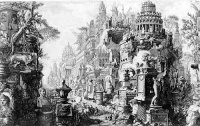Julius Caesar
From The Art and Popular Culture Encyclopedia
|
"The character of the First Caesar has perhaps never been worse appreciated than by him who in one sense described it best; that is, with most force and eloquence wherever he really _did_ comprehend it. This was Lucan, who has nowhere exhibited more brilliant rhetoric, nor wandered more from the truth, than in the contrasted portraits of Caesar and Pompey. The famous line, _"Nil actum reputans si quid superesset agendum,"_ is a fine feature of the real character, finely expressed. But, if it had been Lucan's purpose (as possibly, with a view to Pompey's benefit, in some respects it was) utterly and extravagantly to falsify the character of the great Dictator, by no single trait could he more effectually have fulfilled that purpose, nor in fewer words, than by this expressive passage, _"Gaudensque viam fecisse ruina."_ Such a trait would be almost extravagant applied even to Marius, who (though in many respects a perfect model of Roman grandeur, massy, columnar, imperturbable, and more perhaps than any one man recorded in History capable of justifying the bold illustration of that character in Horace, "_Si fractus illabatur orbis, impavidum ferient ruinae_") had, however, a ferocity in his character, and a touch of the devil in him, very rarely united with the same tranquil intrepidity. But, for Caesar, the all-accomplished statesman, the splendid orator, the man of elegant habits and polished taste, the patron of the fine arts in a degree transcending all example of his own or the previous age, and as a man of general literature so much beyond his contemporaries, except Cicero, that he looked down even upon the brilliant Sylla as an illiterate person--to class such a man with the race of furious destroyers exulting in the desolations they spread is to err not by an individual trait, but by the whole genus. The Attilas and the Tamerlanes, who rejoice in avowing themselves the scourges of God, and the special instruments of his wrath, have no one feature of affinity to the polished and humane Caesar, and would as little have comprehended his character as he could have respected theirs. Even Cato, the unworthy hero of Lucan, might have suggested to him a little more truth in this instance, by a celebrated remark which he made on the characteristic distinction of Caesar, in comparison with other revolutionary disturbers; for, said he, whereas others had attempted the overthrow of the state in a continued paroxysm of fury, and in a state of mind resembling the lunacy of intoxication, Caesar, on the contrary, among that whole class of civil disturbers, was the only one who had come to the task in a temper of sobriety and moderation _(unum accessisse sobrium ad rempublicam delendam)_...."--Thomas De Quincey introduction to Commentarii de Bello Gallico by Julius Caesar |

Illustration: Piranesi's fictitious Roman ruins.
|
Related e |
|
Featured: |
Gaius Julius Caesar (100 BC or 102 BC – 44 BC), was a Roman military and political leader and one of the most influential men of World history. He played a critical role in the transformation of the Roman Republic into the Roman Empire.
Literary works
Caesar was considered during his lifetime to be one of the best orators and authors of prose in Rome—even Cicero spoke highly of Caesar's rhetoric and style. Among his most famous works were his funeral oration for his paternal aunt Julia and his Anticato, a document written to blacken Cato's reputation and respond to Cicero's Cato memorial. Poems by Caesar are also mentioned in ancient sources. His works other than his war commentaries have been lost, although a few sentences are quoted by other authors.
Memoirs
- The Commentarii de Bello Gallico (Commentaries on the Gallic War), campaigns in Gallia and Britannia during his term as proconsul; and
- The Commentarii de Bello Civili (Commentaries on the Civil War), events of the Civil War until immediately after Pompey's death in Egypt.
Other works historically attributed to Caesar, but whose authorship is doubted, are:
- De Bello Alexandrino (On the Alexandrine War), campaign in Alexandria;
- De Bello Africo (On the African War), campaigns in North Africa; and
- De Bello Hispaniensi (On the Hispanic War), campaigns in the Iberian peninsula.
These narratives were written and published on a yearly basis during or just after the actual campaigns, as a sort of "dispatches from the front". Apparently simple and direct in style—to the point that Caesar's Commentarii are commonly studied by first and second year Latin students—they are in fact highly sophisticated tracts, aimed most particularly at the middle-brow readership of minor aristocratsTemplate:Citation needed in Rome, Italy, and the provinces.
Legend and legacy
In the Middle Ages Caesar was created a member of the Nine Worthies, a group of heroes encapsulating all the ideal qualities of chivalry.

